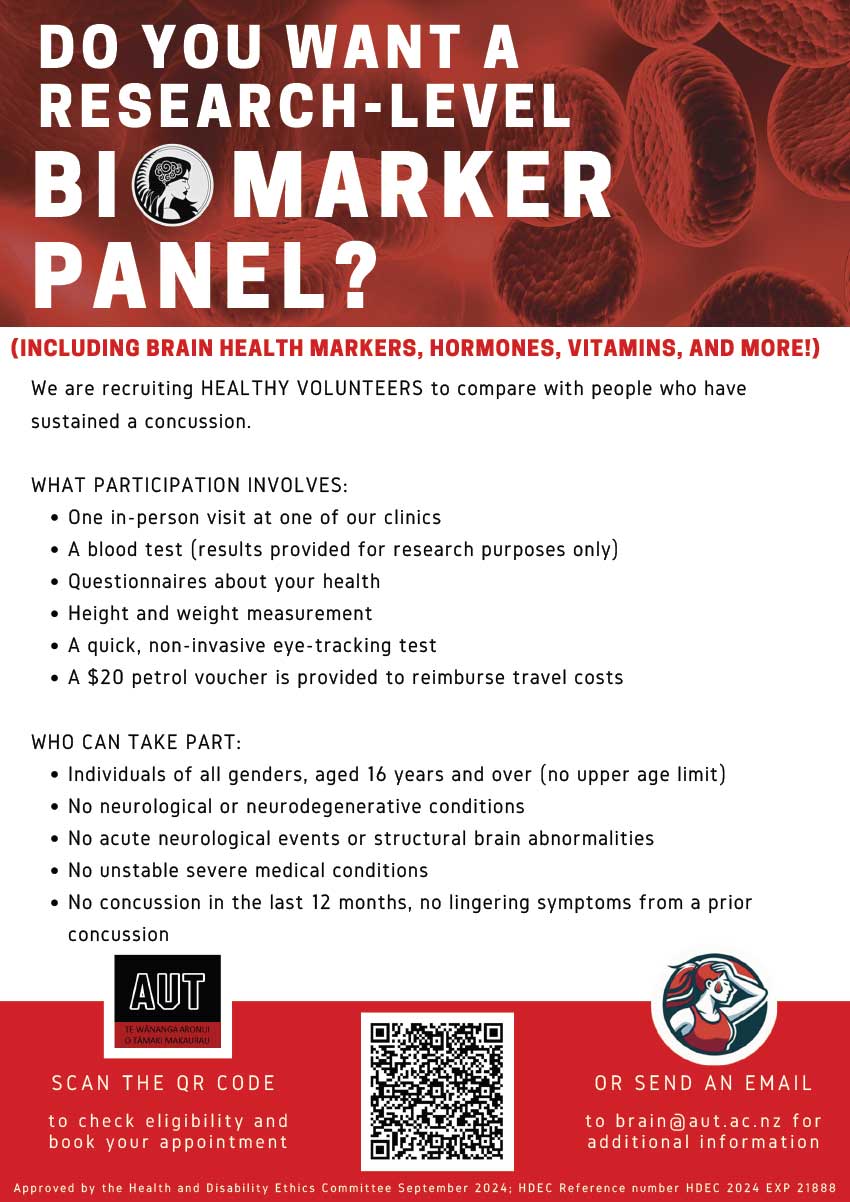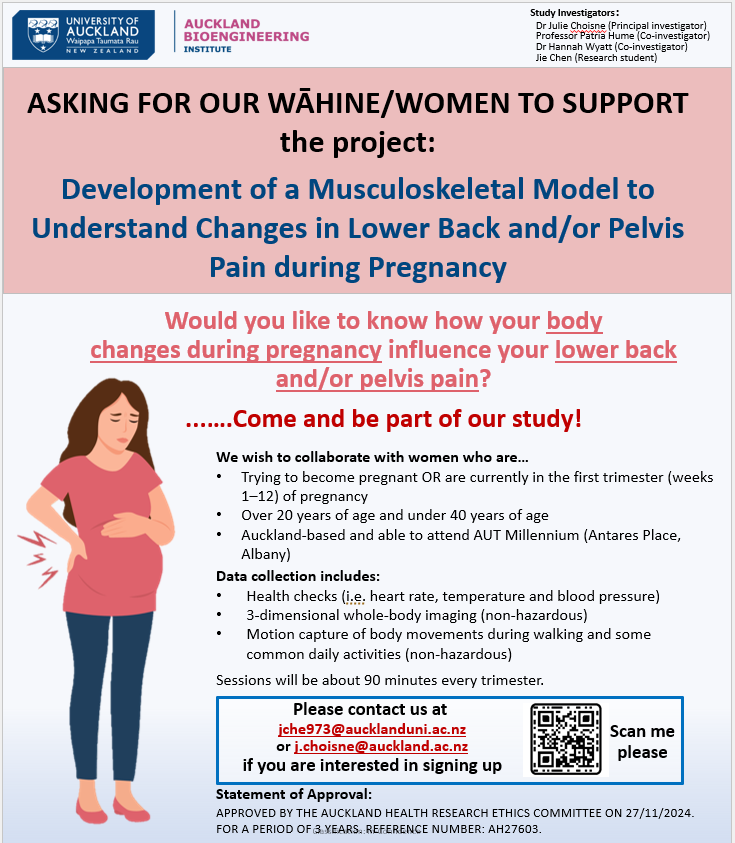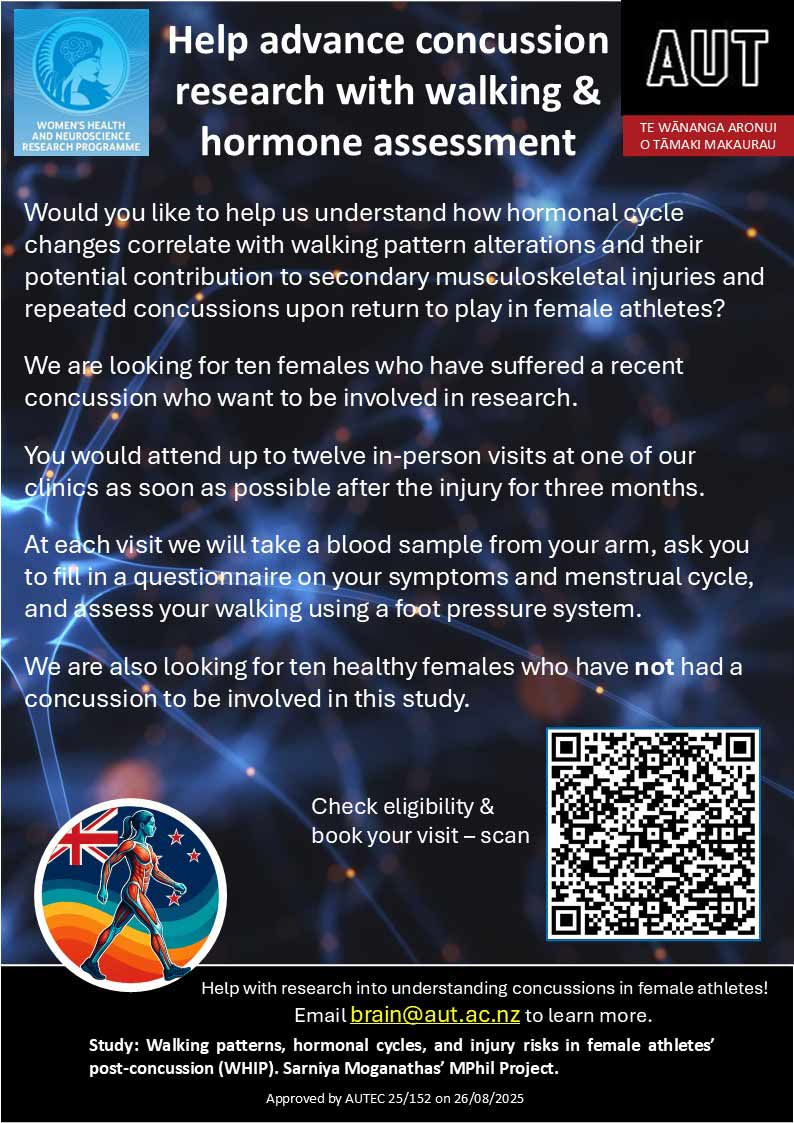Women’s health and neuroscience research programme
The overall research programme focuses on women, women’s health, fertility, brain, nutrition, neuroendocrine and female athlete optimisation. We want to investigate the intricate relationship between hormones and concussion outcomes, which is essential for developing targeted interventions and improving the wellbeing of females, who may experience unique hormonal responses after concussions. There will be a number of studies in the women’s health and neuroscience (WHN) research programme.
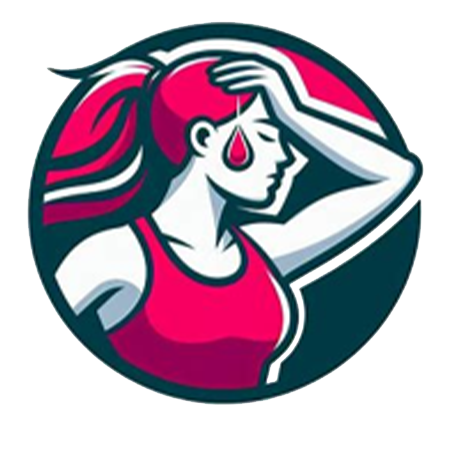
Participant recruitment
We're looking for female and male participants 16 years or older who have experienced a RECENT (i.e., within seven months of joining the study) mild to moderate traumatic brain injury (mTBI). To join the mTBI group, individuals must be evaluated by a qualified healthcare professional who believes they have likely suffered an mTBI.
If you have experienced a head knock or suspect you have sustained a concussion, and are interested in participating in this study, we also offer on-site concussion diagnosis every Monday between 12:15pm and 1:15pm at our AUT Millennium Brain Health Hub clinic (level 2) hosted by Dr Sam Wootton (MBBS, FRNZCC). This one-off assessment provides an opportunity for free screening for study inclusion, and where necessary a recommendation for appropriate follow-up care will be made.
Book your free screening and concussion diagnosis
We are also looking for female and male participants 16 years or older to be in the Healthy control group. If you have NOT had a mTBI within the last 12 months or are NOT experiencing lingering symptoms from a previous mTBI, you can be in the healthy control group.
Interested individuals can read the Participant Information Sheet to ensure you meet the inclusion criteria (stated below), and then provide informed consent by filling in the consent form (download and open in word) and mailing to the research team via brain@aut.ac.nz. You can then book an assessment time.
Read frequently asked questions for interested participants
For all participant enquiries email brain@aut.ac.nz or call 021 968 731.
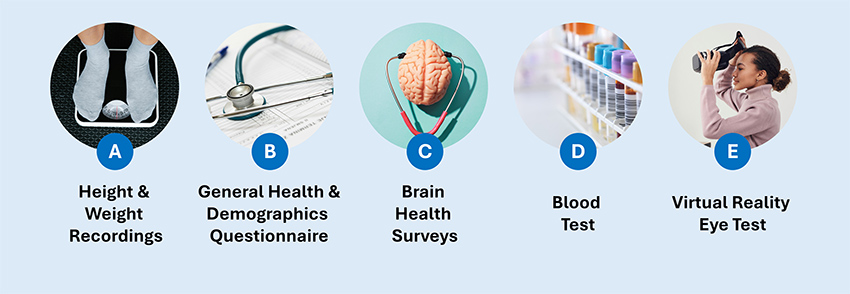
Women’s health and neuroscience research projects in progress
For details please click on the project titles below.
The study hopes to improve how we detect and manage mild traumatic brain injuries (mTBI) using blood tests for females and males.
We aim to understand whether biomarkers (I.e., GFAP and UCH-L1) can assist in monitoring mTBI recovery in females and males. The main study questions are:
- What are the optimal sampling times for blood biomarkers to determine the prediction of recovery from mTBI for females and males?
- What is the feasibility of blood biomarker data collection in the NZ environment?
- What are the effects of confounding factors (i.e., sex, age, ethnicity) on mTBI blood biomarkers in a patients with mTBI?
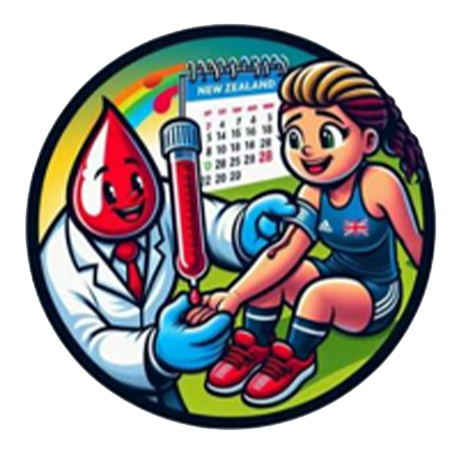
Participant recruitment
We're looking for female and male participants 16 years or older who have experienced a RECENT (i.e., within seven months of joining the study) mild to moderate traumatic brain injury (mTBI). To join the mTBI group, individuals must be evaluated by a qualified healthcare professional who believes they have likely suffered an mTBI.
If you have experienced a head knock or suspect you have sustained a concussion, and are interested in participating in this study, we also offer on-site concussion diagnosis every Monday between 12:15pm and 1:15pm at our AUT Millennium Brain Health Hub clinic (level 2) hosted by Dr Sam Wootton (MBBS, FRNZCC). This one-off assessment provides an opportunity for free screening for study inclusion, and where necessary a recommendation for appropriate follow-up care will be made.
Book your free screening and concussion diagnosis
We are also looking for female and male participants 16 years or older to be in the Healthy control group. If you have NOT had a mTBI within the last 12 months or are NOT experiencing lingering symptoms from a previous mTBI, you can be in the healthy control group.
Interested individuals can read the Participant Information Sheet to ensure you meet the inclusion criteria, and then provide informed consent by filling in the consent form (download and open in word) and mailing to the research team via brain@aut.ac.nz. You can then book an assessment time.
Read frequently asked questions for interested participants
For all participant enquiries email brain@aut.ac.nz or call 021 968 731.

Who can take part in the study?
You have been invited to take part in this study because you are aged 16 years and older and are either healthy or have recently suffered a mild traumatic brain injury (mTBI). You will be able to start the study if you meet the inclusion criteria outlined below.
To take part in the study you need to be aged 16 or older, reside in New Zealand, be able to provide informed consent, able to provide a blood sample and (for the mTBI group) have sustained a recent mTBI/concussion.
You can NOT take part in the study is you have a suspected or confirmed neurodegenerative conditions or dementia, including, but not limited to, dementia (Alzheimer’s disease, and vascular, Lewy body, or frontotemporal dementia), Parkinson’s, Huntington’s, motor neurone disease and mild cognitive impairment, and no history of acute neurological events or structural brain abnormalities including TBI, stroke, seizure, epilepsy, chronic headache, and brain tumour and no unstable severe medical conditions for example; cancer, severe coagulopathy, terminal illness, end-stage organ failure, acute kidney dysfunction, chronic kidney dysfunction or renal failure.
If you are a control, you can NOT take part in this study if you have experienced a mTBI within the last 12 months or are experiencing lingering symptoms from a previous mTBI.
Quick facts
Study acronym: Concussion Blood Sampling (CBS)
Study period: Feb 2025 to Dec 2025
HDEC ethics: HDEC #2024 EXP 21888. 2024-2027. (Approved 14th March 2024 for three years.)
AUTEC ethics: AUTEC 25/138. Approved 1st May 2025 for three years.
Clinical trial registration number: ACTRN12625000260426. Approved 9th April 2025 for three years.
Further information
Research team members
Co-ordinating Principle Investigator: Professor Patria Hume
Co-Principle Investigators: Dr Ed Maunder, Scott Crawford, Dr Doug King, Dr Beth McQuiston, Dr Chris Puliu’vea, Dr Stephen Kara, Professor Alice Theadom, Assoc Prof Mangor Pedersen, Dr Anja Zoellner.
Co-Associate Investigators: Dr Ryu Yoshida, Dr Helen Danesh-Myer, Dr Mark Fulcher, Dr Swati Pradhan-Bhatt, Katherine Forch, Dr Trevor Clark, Dr Sapi Mukerji, Prof Andrew Kilding, Dr Danielle Yang, Dr Sharon Olsen, Dr Stacy Sims, Dr Brian Russell, Dr Ken Quarrie, Christina Emmerson, Dr Christi Essex, Dr Kuniaki Hirayama, Marguerite Sandleback.
Research students: Nikki Reynolds, Charlotte Bray.
Māori research team members: Dr Doug King (Ngāi Tūhaitara, Ngāi Tūhu), Dr Trevor Clark (Tainui, Ngaati Korokii Kahukura), Dr Stephen Kara.
Pasifica research team members: Dr Chris Puliu’vea, Assoc Prof Mangor Pedersen.
This study hopes to improve how we detect and manage mild traumatic brain injuries (mTBI) using eye-tracking tools.
We aim to understand how eye-tracking with virtual reality technology can assist in monitoring mTBI recovery. The main study questions are:
- What are the typical baseline values and population variability for eye tracking metrics?
- What is the feasibility of data collection for eye tracking metrics in the NZ environment?
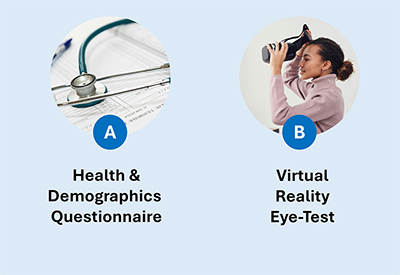

Quick facts
Study acronym: Eye Tracking (ET)
Study period: Feb 2025 to Dec 2027
HDEC ethics: # pending
AUTEC ethics: # pending
Clinical trial registration number: pending
Research team members
Co-ordinating Investigator: Nikki Reynolds
Co-Principle Investigators: Professor Patria Hume, Professor Alice Theadom, Professor Helen Danesh-Meyer.
Co-Associate Investigators: Dr Doug King (Ngāi Tūhaitara, Ngāi Tūhu), Dr Chris Puliu’vea, Scott Crawford, Marguerite Sandleback, Christi Essex.
Data collection complete - results will be available soon
We are currently recruiting for this project.
Project team
- Jie Chen
- Julie Choisne
- Patria Hume
- Hannah Wyatt.
UoA Ethics AH27603 approved to 27/11/2027
For further information contact: Jie Chen jie.chen@aut.ac.nz
The purpose of this study is to investigate the relationship between salivary hormone profiles and symptoms across the menstrual cycle as monitored by a menstrual cycle tracking app (WILD AI) in healthy eumenorrheic (naturally regularly menstruating) females. The hormones included in the salivary measures will be estrogen, progesterone and cortisol. The second part of this study is to confirm salivary measures of estrogen and progesterone against blood serum.
Estrogen and progesterone, the primary female sex hormones, are typically associated with reproduction and are linked to brain health. Cortisol is the primary stress hormone, and levels of cortisol can influence female sex hormones.
Knowledge gained from this study about how salivary hormone profiles change in relation to symptoms throughout the menstrual cycle will be used to inform a related study that will investigate symptoms in females recovering from sports-related concussion.
(AUTEC 21/167 valid to 9 July 2024)
Data collection complete - results will be available soon
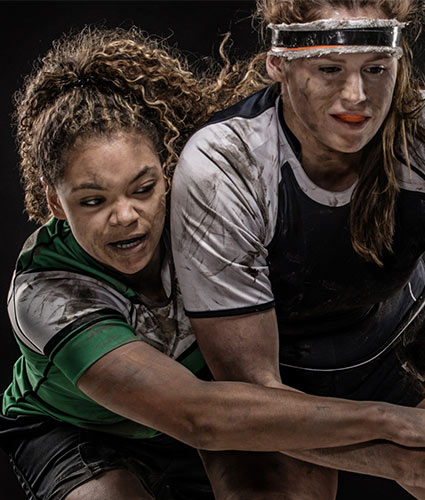
The purpose of this study is to increase our understanding of how the female sex hormones influence the symptomology and time to recover from concussion/mTBI (from all environments) in general population females. This study also considers whether energy availability may be a modifier in the symptomology and time to recover from concussion/mTBI in females.
This knowledge will help direct future research and inform clinical decision making for doctors and other members of the multidisciplinary team during treatment and rehabilitation of females with concussion/mTBI.
Participants
This study is now recruiting females of reproductive age presenting to Emergency Departments in Wellington with a suspected concussion. The study aims to understand the how hormone profiles at point of injury may impact on time to recovery. A secondary aim of the study is to investigate the expression of salivary miRNAs in females with concussion and whether this is influenced by hormone profile.
Principal investigator: Natalie Hardaker
(HDEC EXP 11655)

This study will examine the current level of knowledge around recognising concussion and the attitudes towards concussion (what players and coaches would do if they suspected a concussion). The study will target as many amateur football players and coaches from around the world as possible and will also examine if there is a difference in these two domains (knowledge and attitudes) between females and males.
Findings from this study will highlight areas to target education to address knowledge deficiencies and unsafe attitudes towards concussion. A greater understanding of how players and coaches perceive concussion will help direct how we can support players to stay in the game and protect long term health. The results of this study can also be used as a baseline against which the effectiveness of any interventions used to improve knowledge and attitudes around concussion can be measured.
The Rosenbaum Concussion Knowledge and Attitudes Survey (RoCKAS) will be made available online and takes approximately 10 minutes to complete. The study will be promoted through social media channels (facebook and twitter), email databases and via posters advertising the study in football club rooms (in NZ only).
Data collection complete - results will be available soon
Principal investigator: Natalie Hardaker
(AUTEC Reference number 22/192 valid until 23 August 2025)
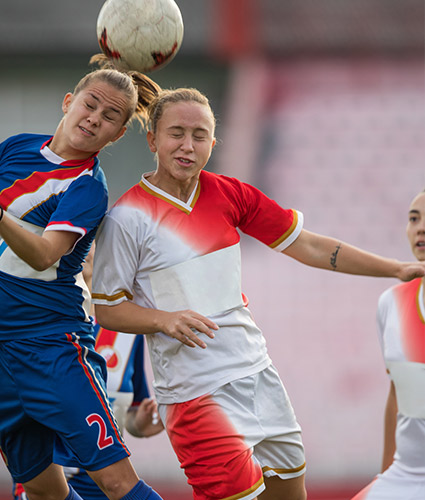
This research study aims to observe preliminary trends in how hormonal cycle changes correlate with gait pattern alterations and their potential contribution to secondary musculoskeletal injuries and repeated concussions upon return to play in female athletes.
You will need to come to one of our clinics (ideally within 7 days post-concussion, then on menstrual cycle days: Menstrual Phase: Days 1–5, Post-Menstrual Phase: Days 6–13, Mid-Cycle (Ovulation): Day 14, Pre-Menstrual Phase: Days 15–24, for three months). Three menstrual cycles will be tracked. This is a total of up to 12 visits, and these dates will be provided for you.
Participant recruitment
Who can participate?
- Female athletes with a recent concussion (˂7 days post injury)
- Healthy females (no concussion history in the past 12 months) as a control group
Inclusion criteria
for both concussion and healthy groups
- Female, 18+ years old
- Residing in Auckland, New Zealand
- Naturally menstruating with regular menstrual cycles
- Willing to attend 12 sessions and provide blood samples
- For the concussion group: diagnosed mild traumatic brain injury (mTBI) by a licensed health professional
Exclusion criteria
- Under 18 years old
- Cannot provide informed consent
- Unable to walk independently for 2 minutes
- Unwilling to provide a blood sample, track menstrual cycles, or monitor gait
- History of neurological or neurodegenerative disorders
- Severe or unstable medical conditions
- Musculoskeletal injury limiting walking or balance
- Use of contraceptive
If you have experienced a head knock or suspect you have sustained a concussion, and are interested in participating in this study, we also offer on-site concussion diagnosis every Monday between 12.15pm and 1.15pm at our AUT Millennium Brain Health Hub clinic (level 2) hosted by Dr Sam Wootton (MBBS, FRNZCC). This one-off assessment provides an opportunity for free screening for study inclusion, and where necessary a recommendation for appropriate follow-up care will be made.
Book your free screening and concussion diagnosis
For all participant enquiries email brain@aut.ac.nz or call 022 533 4369.
Quick facts
Study acronym: WHIP
Study period: 26 Aug 2025 to 26 Aug 2028
HDEC ethics: HDEC #2024 EXP 21888
AUTEC ethics: 25/152
Further information
Research team members
Co-ordinating Investigator: Professor Patria Hume
Co-Principal Investigators: Dr Nusratnaaz Shaikh
Co-Associate Investigators: Dr Anja Zoellner, Dr Christi Essex, Marguerite Sandleback
Primary Researcher: Sarniya Moganathas
Sponsor: Auckland University of Technology
The purpose of this study is to understand how sex hormones may influence the occurrence of and recovery from sports related concussion (SRC) in female athletes. This study will also consider whether the female sex hormones influence biomarkers specifically related to concussion.
This knowledge will help direct future research and inform the development of female specific prevention and recovery protocols for female athletes with SRC.
Participants
The study is prospectively investigating a cohort of eumenorrheic athletes from sports with a high risk of SRC including; Football (soccer), League, Rugby and Netball in New Zealand. The athletes will be recruited into 3 groups:
- SRC group - athletes that sustain an SRC during the season;
- Control group - age matched athletes that do not sustain an SRC or any other musculoskeletal injury;
- SubConc group - athletes (four per match) recruited at random by the research team to undergo repeat baseline concussion testing
Data collection complete - results will be available soon
Principal investigator: Natalie Hardaker
(HDEC EXP 11904)

Research outputs
Female specific or sex differences research
- Female RNA concussion (FeRNAC) study: assessing hormone profles and salivary RNA in females with concussion by emergency departments in New Zealand: a study protocol. Natalie Hardaker, Doug King, Patria A. Hume, Tom Stewart, Stacy Sims, Indira Basu , Blair Shilton8 and James Selfe
- Differences in Injury Profiles Between Female and Male Athletes Across the Participant Classification Framework: A Systematic Review and Meta‑Analysis Natalie J. Hardaker, Patria A. Hume, Stacy T. Sims
- Is there a role for menstrual cycle phased resistance training programmes for women post anterior cruciate ligament reconstruction? A scoping review protocol E O’Loughlin, D Reid, S Sims Physical Therapy Reviews, 1-5
- “This is the next frontier of performance”: power and knowledge in coaches “proactive” approaches to sportswomen’s health KL Schofield, H Thorpe, ST Sims Sports Coaching Review, 1-22
- The transdisciplinary health research apparatus: A Baradian account of knowledge boundaries and beyond H Thorpe, M Clark, J Brice, S Sims Health 26 (3), 361-384
- Feminist sociology confluences with sport science: Insights, contradictions, and silences in interviewing elite women athletes about low energy availability KL Schofield, H Thorpe, ST Sims Journal of Sport and Social Issues 46 (3), 223-246
- Discussing the menstrual cycle in the sports medicine clinic: perspectives of orthopaedic surgeons, physiotherapists, athletes and patients E O’Loughlin, D Reid, S Sims Qualitative Research in Sport, Exercise and Health, 1-19
Other research
- Application of a nutrition support protocol to encourage optimisation of nutrient intake in provincial academy rugby union athletes in New Zealand: practical considerations and … C Roberts, N Gill, CM Beaven, L Posthumus, S Sims International Journal of Sports Science and Coaching
- Daily protein distribution patterns in professional and semi-professional male Rugby Union players C Roberts, N Gill, K Darry, L Posthumus, S Sims The Journal of Sport and Exercise Science 6 (1), 31-41
Upcoming
- O'Loughlin, E., Reid, D., & Sim, S. (2022, October). Using focus groups to design and evaluate a rehabilitation programme for women post-anterior cruciate ligament reconstruction. Sports Medicine New Zealand Annual Conference. Wellington, New Zealand: Sports Medicine New Zealand.
- George, E., Reid, D., & Sheerin, K. (2022, October). Title to be confirmed. Sports Medicine New Zealand Annual Conference. Wellington, New Zealand: Sports Medicine New Zealand.
Past
- O'Loughlin, E., Reid, D., & Sim, S. (2022, May). Discussing the menstrual cycle in the sports medicine clinic: Perspectives of orthopaedic surgeons, physiotherapists, athletes, and patients. Verbal presentation at the British Association of Sport and Exercise Medicine (BASEM) Conference: Positive Health & Performance, Brighton, UK.
- Partnerships critical to delivering community good Scott Crawford (24 September 2025, Medtech-IQ Aotearoa)
- Why is it so hard to get the right help from ACC following a concussion diagnosis? (04 August 2025, The Listener)
- AUT and Abbott launch pioneering female athlete health research initiative (9 July 2025, NZ Herald)
- AUT And Abbott Team Up To Tackle Concussions & Women’s Health (30 April 2025, Scoop)
- Once taboo: A womans cycle helps rebuild from injury Emma O’Loughlin – Newsroom ACL - 06.04.2022
- Hopes menstrual cycle can help in post-surgery recovery/ Emma O’Loughlin - 1News ACL
- Lydia Ko's time of the month comment showed how far sportswomen have come and how much still has to change Lydia Ko – Menstrual cycle comment - 04.05.2022
- Lydia Ko's time of the month comment showed how far sportswomen have come and how much still has to change Lydia Ko – Menstrual cycle comment - 05.05.2022
- Article in Women's Running on Want to Get Fast? Stop Fasting (Subscription needed).
- Special Report by Jade Amies from Leaders In Sport on The Female Lead: The evolution of athlete and coach development in women’s sport.
- Article by Lindsey Tramuta from Fortune on How a femtech app is using A.I. to fill in the gaps for women’s health care.
- Article by Bridie Wilkins from Women's Health on How the contraceptive pill affects training and recovery.
- Article by the editorial team at The Chalkboard on Exposing Women's Fitness Myths: How To Workout Through The 4 Phases Of Your Cycle.
- Interview with Abby Bertics from The Economist on How menstruation affects athletic prowess is poorly understood. (Subscription needed)
- Article by Erin Wood in Women's Health on What Is Cardiovascular Endurance? Experts Explain Training Tips, Benefits, And More.
- Article by Karla Walsh in Runner's World on How an Eating Disorder Can Affect Hormones—and How to Get Them Back on Track.
- Article by Susie Reiner from Tonal on The Three Biggest Myths About Strength Training For Women, Debunked by Science.
- Article by Susie Reiner from Tonal on A Decade-By-Decade Guide on Strength Training for Women.
- Article in Well+Good with Dominique Astorino on Why There’s Such a Big Gap in Women’s Sports Performance Research—And What’s Being Done About It.
Radio interviews
- Pacific and Māori athletes sought for concussion research 01.08.2025 - PMN Tonga - Chris Puli'uvea
- Reasearch into improving female athletes concussion rates 11.07.2025 - RNZ - Alice Theadom
- Menstrual Hormones could be sport advantage 04.05.2022 – RNZ – Stacy Sims
- Episode 192 with Emma O'Loughlin 10.05.2022 - Dirt Church Radio – Emma O’Loughlin
- TV1 Breakfast snippet 03.07.2022 - TV1 Breakfast - Stacy Sims
Podcasts
- Echoes of Impact pocast hosted by Ali Mau featuring WHN principal investigators and former All Black
- Podcast with FastTalk labs https://www.fasttalklabs.com/fast-talk/maximizing-the-physiology-and-performance-of-the-female-athlete-with-dr-stacy-sims/
- Podcast with India Rakusen from the BBC's 28(ish) Days Later series on Day Twenty-Three: Exercycle
- Interview with Equinox for The Strength Collection on Biohacking Hormones for A Training Advantage.
- Podcast with Ashleigh van Houten from Muscle Science for Women on Women Are Not Small Men with Dr. Stacy Sims
- Podcast with Gabby Reece from The Gabby Reece Show on Dr. Stacy Sims: Leading Expert on Female Physiology & Training.
- Podcast by Paige Knapp from Paige Talks Wellness on Why Women do Better Fed with Dr. Stacy Sims.
- Podcast with Dr. Pam Peeke from the HER Podcast on Work WITH your physiology, NOT against it!
- Podcast with Maghalie Rochette from Fever Talk on Contraceptive Methods with Dr. Stacy Sims.
- Podcast with Maghalie Rochette from Fever Talk on What is Normal Menstrual Health.
- Podcast with Nicole Jardim from The Period Fixer on Women Are Not Small Men.
Watch Professor Patria Hume's interview on 7 Sharp with Hillary Barry and Jeremy Wells, discussing concussion risks, symptoms, and our groundbreaking blood biomarker programme.
We conduct research projects to help improve women’s health with focus on brain health using:
- Brain health screening - Brain-WOF™
- Brain injury screening - BIST™
- Blood biomarkers for brain, hormones, health
- Menstrual cycle tracking
- Eye tracking
- Brain scanning
- Balance testing
- Psychology assessments
- Physiology assessments
- Biomechanics assessments
- Body composition assessments
Practical guidelines and resources
Industry Partners


Contact us
Auckland location
Scott Crawford
Research Operations Senior Manager
brain@aut.ac.nz
021 968 731
Dr Christi Essex
Women's Health and Neuroscience Postdoctoral Fellow
brain@aut.ac.nz
021 968 731
Marguerite Sandleback
Women's Health and Neuroscience Research Officer
brain@aut.ac.nz
021 968 731
Hutt Valley (Wellington) location
Research Nurses
researchHVED@gmail.com
Our team
This research programme has been co-created with iwi, interdisciplinary researchers and people from various backgrounds and ethnicities.
Te Kukunetanga: Developing Cycle of Life Research Programme
Te Kukunetanga is a series of projects aiming to improve the pregnancy journey and outcomes for wahine and their whanau.
Brain Health Clinic and research programme
The AUT Brain Health research programme is a collaboration between SPRINZ and the Traumatic Brain Injury Network (TBIN). We focus on how to prevent, identify and treat traumatic brain injuries (TBIs), with the aim of working towards better health and wellbeing for people affected by TBI.
Study with us
We are keen to collaborate with postgrad students who want to study how to improve health outcomes for women at master’s or doctoral level. Our supervisors are experienced in a range of fields.

